Free AI User Story Generator
Create User Stories, Edit Online with AI-Powered User Story Editor
Template.net’s Free AI User Story Generator helps you draft high-quality user stories in seconds. Edit online with your project labels, epics, personas, and tone to ensure every user story is structured, testable, and actionable. Whether you're building sprints, writing product documentation, or collaborating across teams, stay agile and aligned. Download in multiple formats, share instantly, and build with speed and clarity.
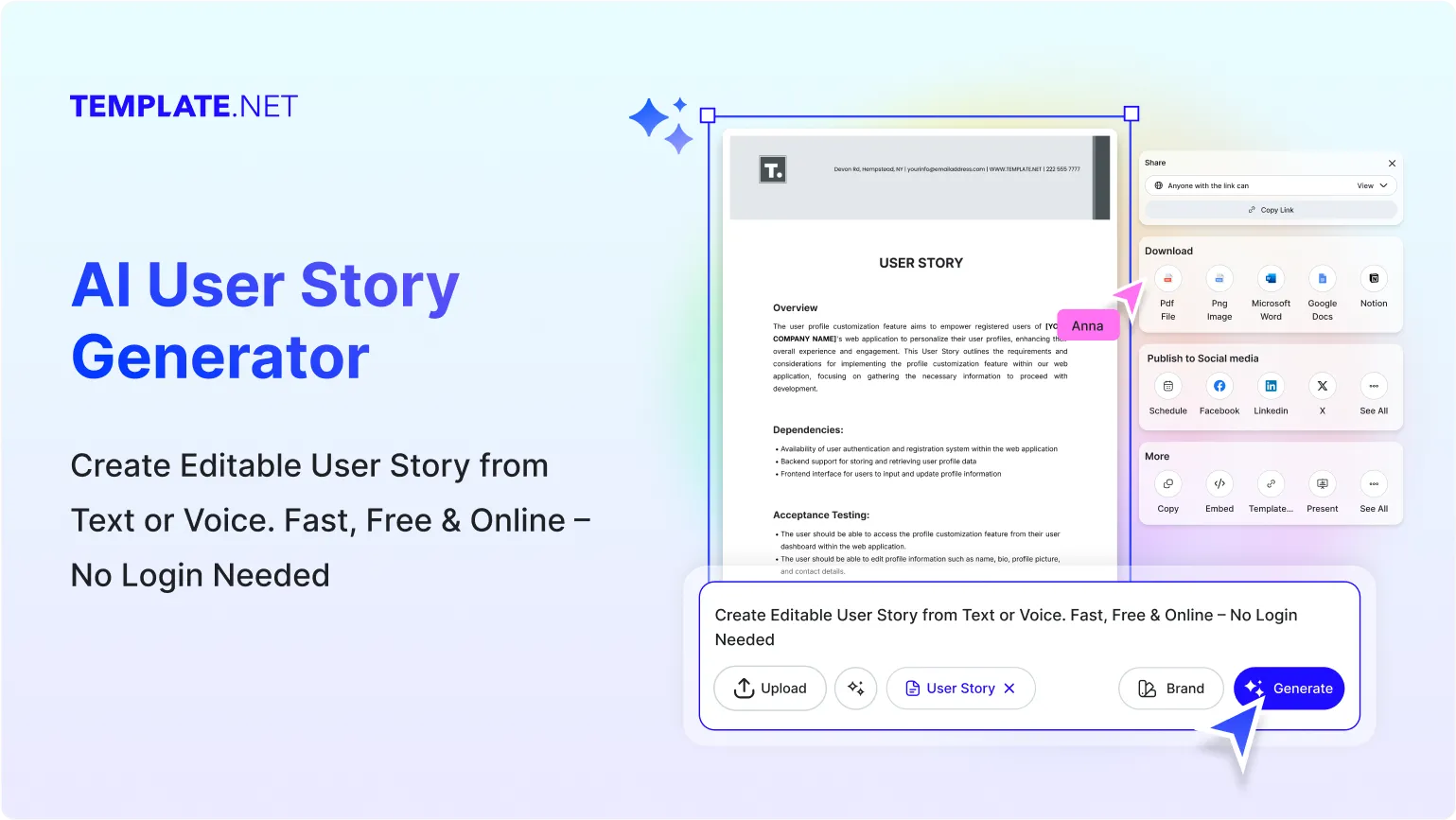
Write Custom User Stories in Seconds
From product backlogs to technical documentation, our AI-powered writing tool helps you craft structured, clear user stories in any format, tone, or language no blank pages, no formatting guesswork.
AI Brand Voice
Choose from formal, conversational, agile, or technical tone settings. Our AI reshapes your user story to match your sprint goals whether you’re building an MVP or updating a legacy system. You can also generate content in your product’s tone with consistent terminology and team-based voice.
AI-Smart Formatting Suggestions
Get instant suggestions for improving user story structure, acceptance criteria, formatting, and flow, especially useful for long epics or complex use cases
Multiple Legal Document Types Supported
Generate a wide range of agile-ready documents including user stories, product specs, release notes, developer guides, customer journeys, and more.
Academic & Professional Formatting
Support for user story mapping, INVEST principles, BDD syntax, and Scrum documentation. Ideal for agile ceremonies, sprint planning, or dev team handovers.
Smart Personalization
Auto-fill user story roles, modules, feature names, sprint numbers, and other context-aware fields to reduce redundant work and maintain consistency.
Auto-Suggested Visuals & Headers
Let AI recommend epic names, subtasks, or hierarchy structure to make your backlog cleaner and more navigable.
Multilingual Document Generation
Generate product stories in 20+ global languages using text or voice prompts.
Languages supported: English, Spanish, French, Hindi, Arabic, Chinese, Portuguese, Bengali, Russian, Japanese, German, Korean, Italian, Turkish, Vietnamese, Urdu, Persian, Polish, Thai, and Punjabi.
Voice-Powered Drafting
On the go? Just speak your user story prompt and let the AI generate it hands-free and instant.
Fully Customizable Text, Styles and Design
Easily update personas, epics, fonts, layout, and styles. Apply consistent branding using built-in design controls. Add from hundreds of agile headers, icons, and cover page formats.
Branding and Visual Control
Apply your product logo, sprint labels, or roadmap visuals to maintain consistency across all user stories and docs.
Citations and Source Generation
Generate references from user research links, interviews, or documentation sources, perfect for including supporting rationale behind user story acceptance.
Real-Time Proofreading
Check grammar, clarity, user story size, and tone in real-time no need for separate grammar tools.
Rewriting and Content Expansion
Ask AI to rewrite a vague user story, split it into smaller tasks, or expand with acceptance criteria all based on agile best practices.
Export in Multiple Formats
Download or share user stories in DOCX, PDF, TXT, PNG. Export to Jira, Trello, Notion, Google Docs, or email instantly.
Real-Time Collaboration
Collaborate live with product owners, designers, and developers. Leave comments, co-edit, and approve user stories in a shared environment.
Secure Cloud Workspace
Store user stories and product documentation securely, assign access levels, and manage project permissions across teams.
Translate Full Documents Instantly
Translate entire user story documents in one click ideal for global product teams and remote collaboration.
Share or Embed Anywhere
Publish via public link, QR code, or embed user story docs into design systems, portals, sprints, or wikis.
Add Signature Blocks
Insert signature fields or approval blocks for stakeholders,ideal for feature sign-offs or design approvals.
Attach Files & Media
Embed mockups, research PDFs, user interviews, videos, or support materials directly into the user story document.
Insert Maps and Locations
Include geolocation data or map views when building user stories for delivery, events, or region-specific apps.
Add Images and Videos
Insert product screenshots, wireframes, or customer feedback videos to visually enhance your user stories.
Add Charts and Graphs
Visualize user story progress, dependencies, or KPIs with built-in bar charts, pie charts, or sprint burndown graphs.
Add Tables and Structured Data
Create agile tables to organize user story points, dependencies, timeline estimates, and acceptance criteria.
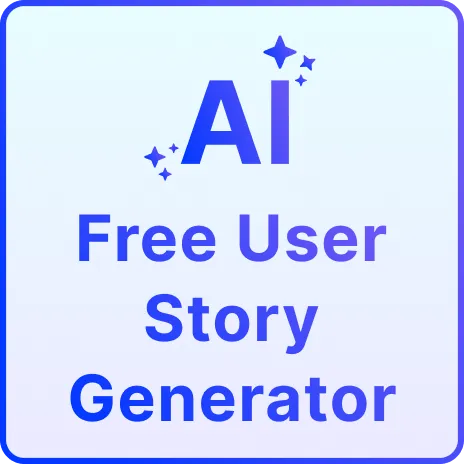
How to Write a Free AI-Generated User Story
Just enter a prompt, customize the draft, and export your complete user story in minutes no formatting, no confusion.
🟦 Step 1: Start with a Prompt
Type or speak your user story objective such as: “Agile User Story,” “Scrum User Story,” or “Software Development User Story.” Our AI understands the agile format and instantly begins writing.
Step 2: Generate and Edit
In seconds, you’ll receive a structured user story with role, need, and goal sections. Refine the language, add acceptance criteria, or generate variations for different user roles.
Step 3: Finalize and Share
Add labels, tags, sprint info, or custom fields. Then export your user story in DOCX, PDF, TXT, or share it instantly via Email, Trello, Jira, WhatsApp, Slack, or generate a live link or QR code for fast access.
Work Smarter and Promote Your Brand
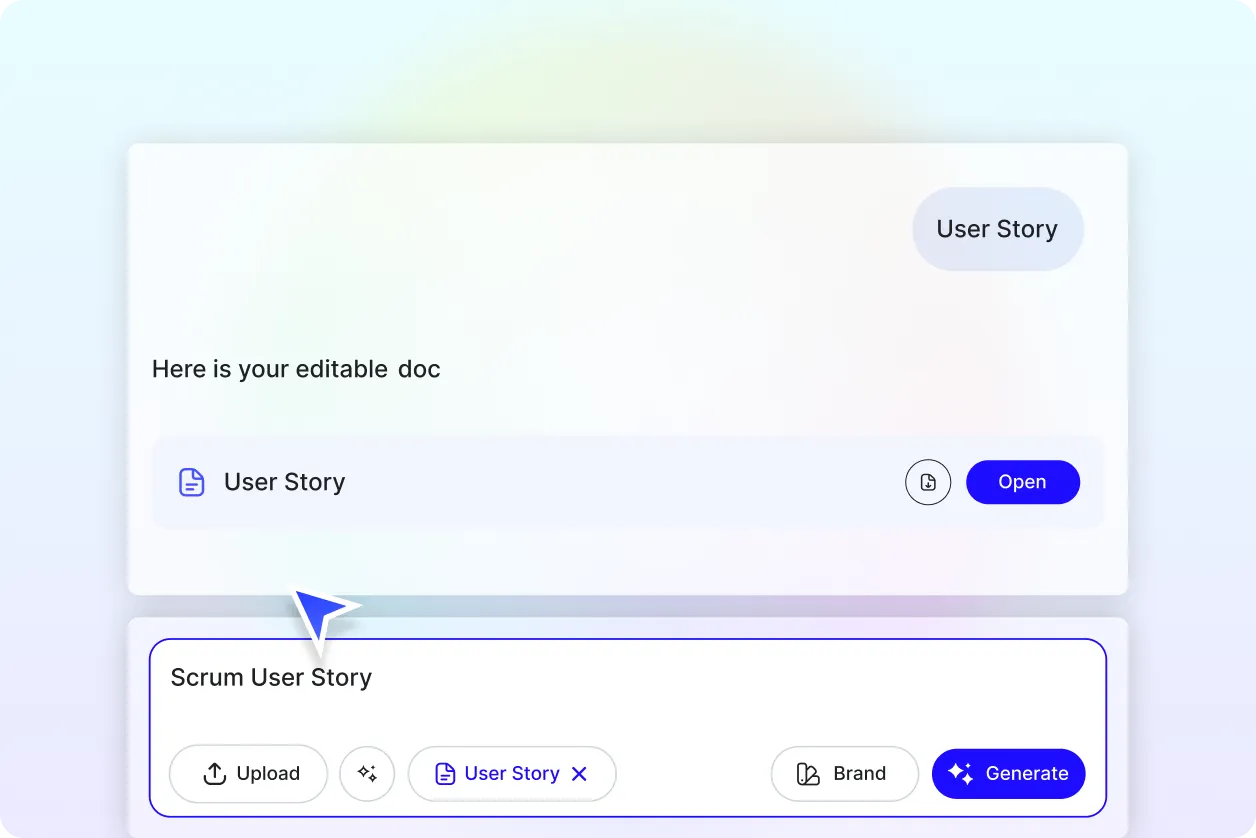
Generate User Stories That Represent You
Match your product tone and team style in seconds. From user roles to voice, every user story reflects your agile identity.
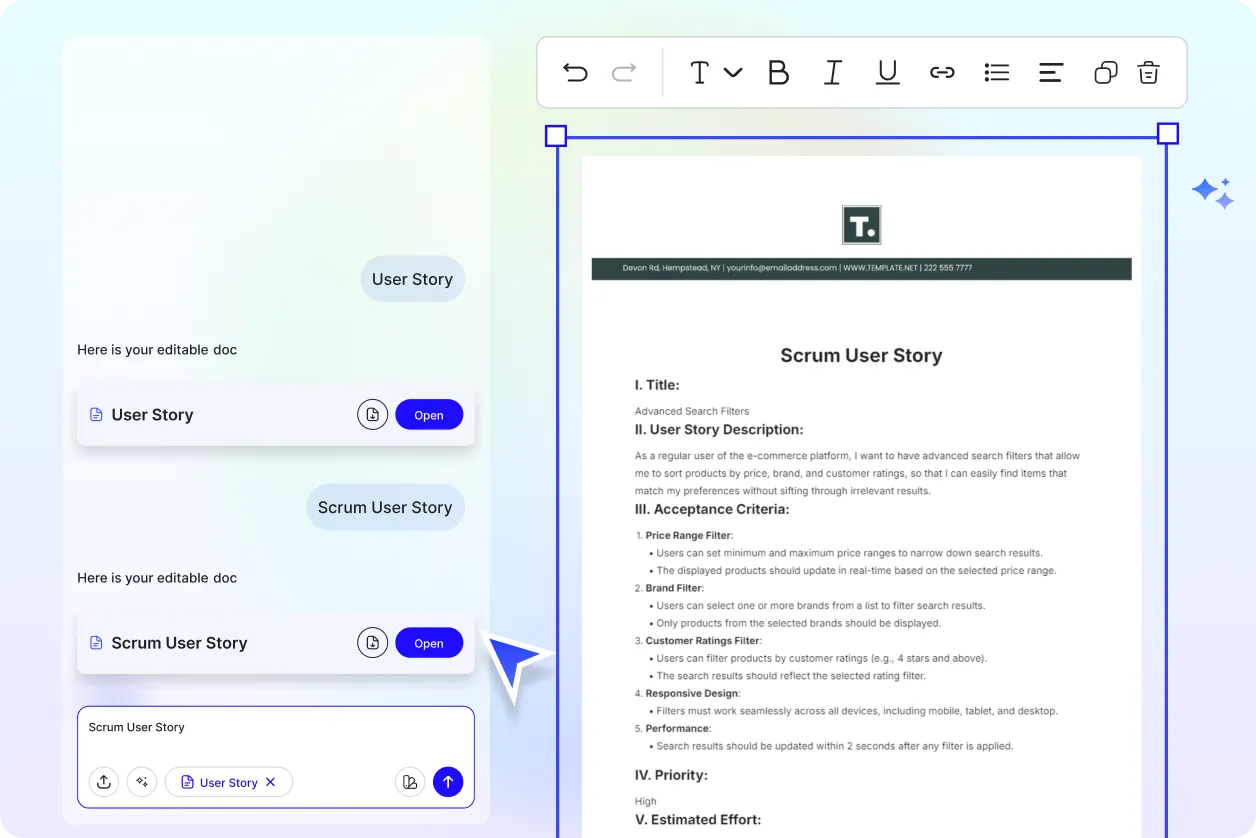
Reuse, Repeat, and Scale Easily
Save well-performing user stories as templates. Edit details and reuse across projects or sprints without writing from scratch.
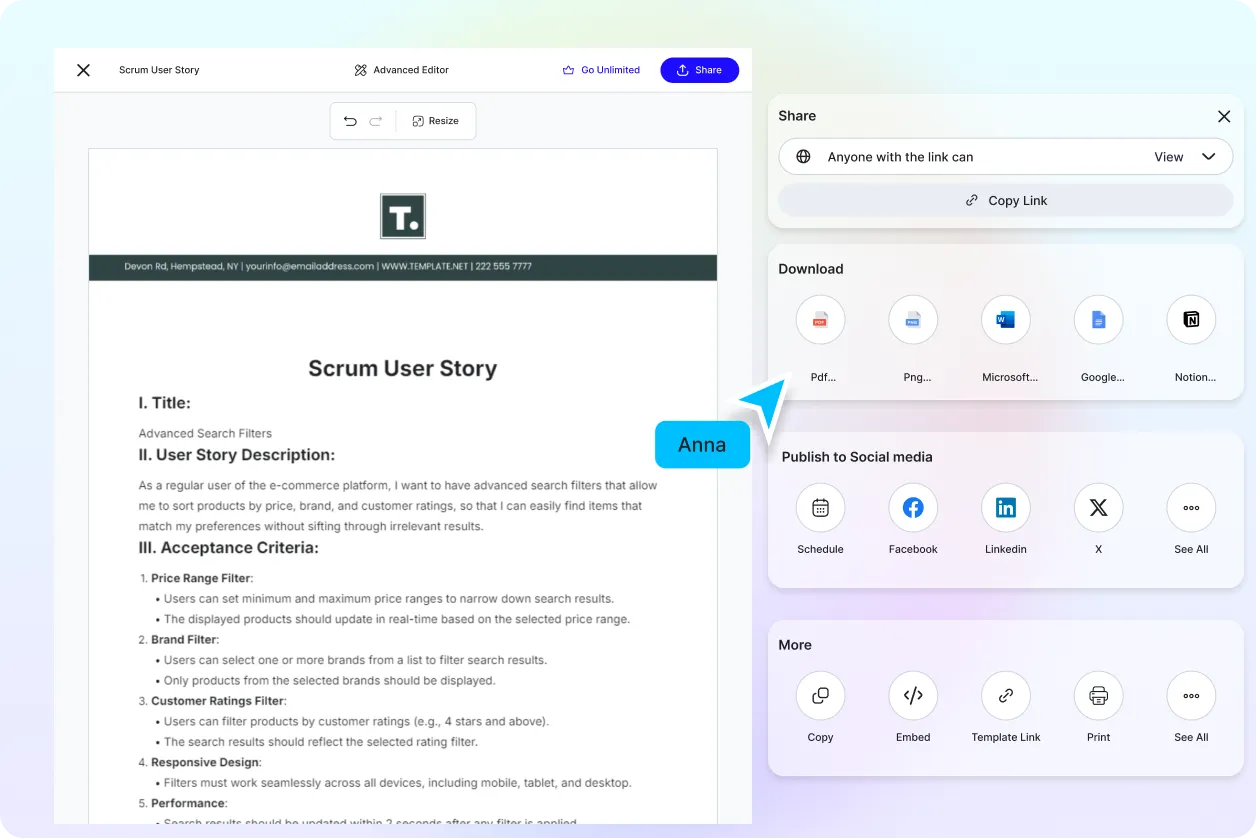
Share Instantly, Collaborate Smoothly
Download or post user stories in DOCX, PDF, TXT. Share across tools, collaborate live, and receive feedback without scattered files or messages.
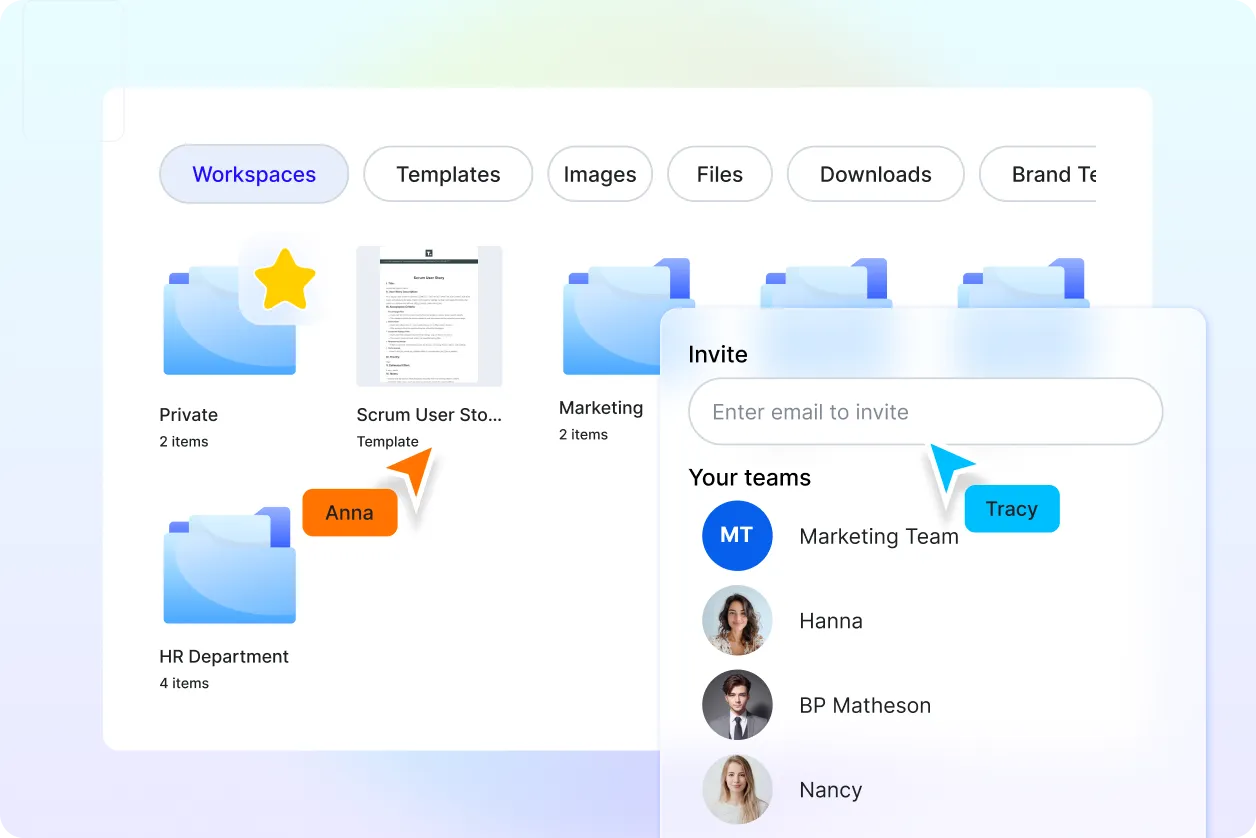
Smart Workspaces for Teams
Build central hubs for product documentation. Assign roles, store epics, and keep every user story version controlled and aligned.
User Story FAQ
What is a user story and how is it used?
A user story is a short, structured statement used in agile development to describe a user’s need. It typically follows the format: “As a [user], I want to [action], so that [goal].” User Stories help teams build focused, testable features that serve real users.
How do I write a user story using AI?
Just enter a simple prompt like “Product Management User Story” or speak it aloud. The AI converts it into a formatted user story with clear role, action, and outcome fields. You can also add acceptance criteria, tasks, or notes.
Can I generate user stories in different languages or team formats?
Yes. You can generate user stories in over 20 global languages using voice or text.
Languages supported: English, Spanish, French, Hindi, Arabic, Chinese, Portuguese, Bengali, Russian, Japanese, German, Korean, Italian, Turkish, Vietnamese, Urdu, Persian, Polish, Thai, and Punjabi. AI adjusts formatting based on agile or custom workflows.
How can I export or share my user story?
You can download your user story in DOCX, PDF, or TXT format, or copy it directly into Trello, Notion, Jira, or other tools. Share via email, public link, QR code, or post directly to Slack, WhatsApp, or other platforms.
What are the parts of a well-formatted user story?
A complete user story includes a user role, the action or feature they want, and the value it provides. It may also include labels, epics, acceptance criteria, story points, and task breakdowns structured to support sprint planning.
Can I rewrite or improve an existing user story with AI?
Yes. Paste any existing user story and the AI can rephrase, split it into sub-stories, or rewrite it using agile best practices while keeping your intent and context intact.
Can I add visuals or technical fields to my user story?
Absolutely. You can insert flowcharts, wireframes, or attach mockups. Add sprint fields, dependencies, labels, or user journey visuals to enrich your documentation and align teams.